David Attenborough being awesome
Here are some clips taken from Life on Air, a 2002 BBC documentary celebrating David Attenborough’s 50 years on television. The entire show is available here. (via @dunstan)



This site is made possible by member support. 💞
Big thanks to Arcustech for hosting the site and offering amazing tech support.
When you buy through links on kottke.org, I may earn an affiliate commission. Thanks for supporting the site!
kottke.org. home of fine hypertext products since 1998.
Here are some clips taken from Life on Air, a 2002 BBC documentary celebrating David Attenborough’s 50 years on television. The entire show is available here. (via @dunstan)
Frinkiac searches through the subtitles from every episode of The Simpsons (in the first 15 seasons) and returns screencaps of all the times when the search term was used. For example, inanimate:
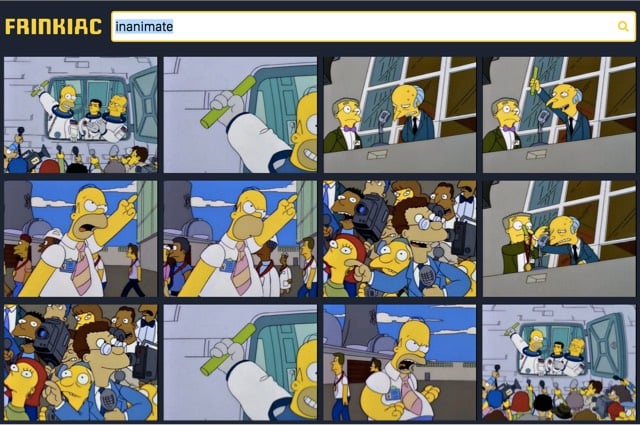
(via @emunn)
Update: Hi diddley ho! The Frinkiac now does animated GIFs. Like this one. (via @buzz)
Oh, this interview with Errol Morris where he talks about Making a Murderer is so so spot on.
To me, it’s a very powerful story, ultimately, not about whether these guys are guilty or innocent — but it’s a very powerful story about a miscarriage of justice.
Yes! If you came out of watching all ten episodes convinced one way or the other whether Avery was innocent, I humbly suggest that you missed the point. And further that you can’t actually know…it’s a TV show! The tip of the iceberg.
Another thing that I was struck by watching Making a Murderer was the feeling of the inexorable grinding of a machine that is producing, potentially, error.
This was my favorite aspect of the show. A lot of people complained about them showing huge chunks of Avery’s and Dassey’s trials, saying that it was too boring, but that’s the whole thing! The crushing boredom of the justice system just grinds those two men and their whole families into the result that the state wanted all along. It was fascinating and horrifying to watch, like a traffic accident in super slow motion.
If you’re asking me, would I sign a petition stating that I believe that Steven Avery is innocent? Well, I don’t know. I really don’t know from watching Making a Murderer, but there’s one thing I do know from watching Making a Murderer — that neither Brendan Dassey nor Steven Avery received a fair trial, and that that trial should be overturned.
My thoughts exactly. If I had to guess, Dassey is entirely innocent and Avery is maybe guilty, but neither of them should have been convicted on the evidence presented or the procedure followed.
Anyway, read the whole thing…his stories about making The Thin Blue Line are great. And he’s making a six-episode true crime show for Netflix? YES!
At Wait But Why, Tim Urban turns history on its side by thinking about time-synchronized events around the world, as opposed to events through the progression of time in each part of the world.
Likewise, I might know that Copernicus began writing his seminal work On the Revolutions of the Celestial Spheres in Poland in the early 1510s, but by learning that right around that same time in Italy, Michelangelo painted the ceiling of the Sistine Chapel, I get a better picture of the times. By learning that it was right while both of these things were happening that Henry VIII married Catherine of Aragon in England, the 1510s suddenly begins to take on a distinct personality. These three facts, when put together, allow me to see a more three-dimensional picture of the 1510s — it allows me to see the 1510s horizontally, like cutting out a complete segment of the vine tangle and examining it all together.
He does this mainly by charting and graphing the lifetimes of famous people, revealing hidden contemporaries.
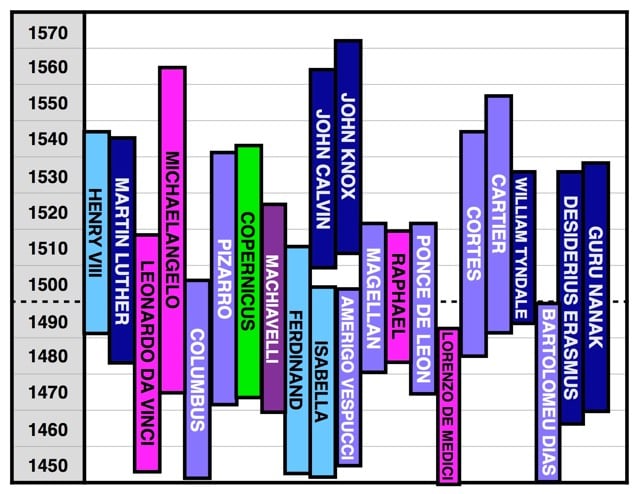
I’ve been slowly making my way through Ken Burns’ remastered The Civil War.1 At a few points in the program, narrator David McCullough reminds the viewer of what was going on around the world at the same time as the war. In the US, 1863 brought the Battle of Gettysburg and The Emancipation Proclamation. But also:
In Paris that year, new paintings by Cezanne, Whistler, and Manet were shown at a special exhibit for outcasts. In Russia, Dostoevsky finished Notes from the Underground. And in London, Karl Marx labored to complete his masterpiece, Das Kapital.
And a year later, while the advantage in the war was turning towards the US:1
In 1864, a rebellion in China that cost 20 million lives finally came to an end. In 1864, the Tsar’s armies conquered Turkistan and Tolstoy finished War and Peace. In 1864, Louis Pasteur pasteurized wine, the Geneva Convention established the neutrality of battlefield hospitals, and Karl Marx founded the International Workingmen’s Association in London and in New York.
Urban explicitly references the war in his post:
People in the US associate the 1860s with Lincoln and the Civil War. But what we overlook is that the 1860s was one of history’s greatest literary decades. In the ten years between 1859 and 1869, Darwin published his world-changing On the Origin of Species (1859), Dickens published A Tale of Two Cities (1859) and Great Expectations (1861), Lewis Carroll published Alice in Wonderland (1865), Dostoyevsky published Crime and Punishment (1866), and Tolstoy capped things off with War and Peace (1869).
The Civil War. The Origin of Species. Alice in Wonderland. The infancy of Impressionism. Pasteurization. Das Kapital. Gregor Mendel’s laws of inheritance. All in an eight-year span. Dang.
Which is simply excellent. I had forgotten how powerful the storytelling technique Burns devised for his documentaries is. Really really worth your time to watch or re-watch.↩
In talking about the Civil War, I’ve been trying to use Michael Todd Landis’ new language…so, “labor camps” instead of “plantations” and “United States” instead of “Union”.↩
Twitter user Andy Pandy fed the scripts for all the episodes of Friends into a neural network and had it generate new scenes. Here’s what it came up with.
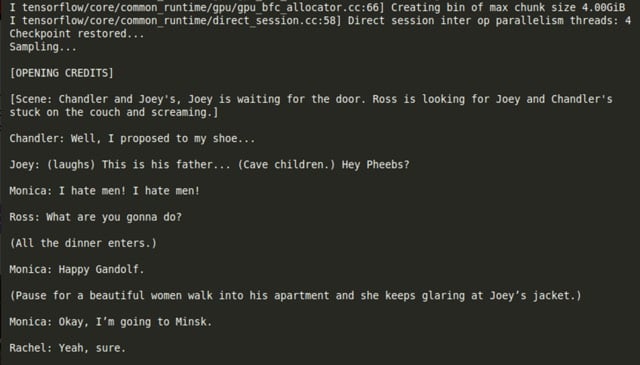
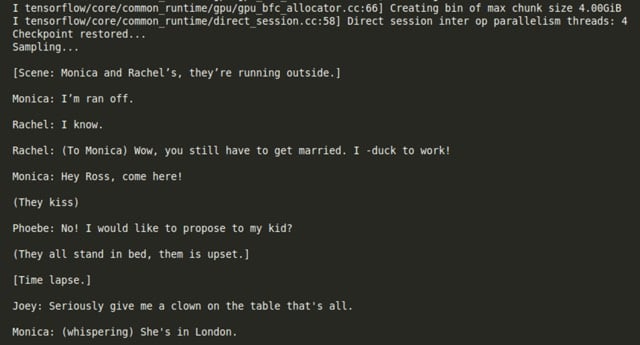
(via @buzz)
Food writer Michael Pollan — author of The Botany of Desire (my fave of his) and originator of the world’s best simple diet: “Eat food. Not too much. Mostly plants.” — is the subject of a four-part Netflix series called Cooked. The series is based on Pollan’s book of the same name and debuts on February 19.
Each episode will focus on a different natural element and its relationship to both ancient and modern cooking methods. In the “Fire” episode, Pollan will delve into the cross-cultural tradition of barbecue by looking at fire-roasts of monitor lizards in Western Australia and visiting with a barbecue pitmaster; in the “Water” episode, he’ll take lessons from kitchens in India and cover the issues surrounding processed foods. An episode titled “Air” explores the science of bread-making and gluten, while the final episode, “Earth,” looks at how fermentation preserves raw foods. Every episode will also feature Pollan in his home kitchen in Berkeley, California, with the intention of underscoring the viewpoint that “surrounded as we are by fast food culture and processed foods, cooking our own meals is the single best thing we can do to take charge of our health and well being.”
Announcing this show only a month out and unaccompanied by a trailer? I have no idea what Netflix is thinking sometimes.
Update: Cooked is now available on Netflix. The NY Times has a review. (via @Ilovetoscore)
In 1980, civil rights hero Rosa Parks appeared on To Tell the Truth, a long-running game show. Parks appeared alongside two other women claiming to be Parks and a celebrity panel tried to guess the identity of the true Parks. See also the appearance of a Lincoln assassination witness on a 50s game show. (via @ptak)
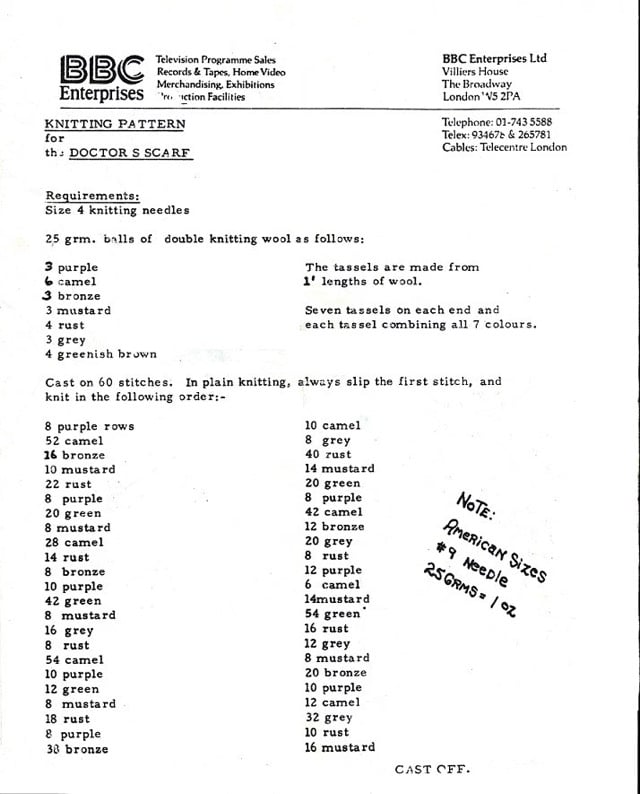
Apparently if you wrote the BBC asking how to make Tom Baker’s Doctor Who scarf, they would send you the knitting instructions on BBC letterhead. According to the Whovians in that forum, the Fourth Doctor wore this particular scarf in a pair of episodes early in season 12. (via laughing squid)
Update: And here’s the Fourth Doctor’s scarf in HTML/CSS/JS by @kosamari.
Jonathan Merritt writes about Fred Rogers, ordained Presbyterian minister and beloved children’s TV show host who used his faith and TV to help millions of children.
Fred Rogers was an ordained minister, but he was no televangelist, and he never tried to impose his beliefs on anyone. Behind the cardigans, though, was a man of deep faith. Using puppets rather than a pulpit, he preached a message of inherent worth and unconditional lovability to young viewers, encouraging them to express their emotions with honesty. The effects were darn near supernatural.
I watched Mr. Rogers religiously growing up, pun intended. Actual church, with its focus on rites, belief in the supernatural, and my pastor’s insistence that the Earth was only 6000 years old, was never appealing to me, but Mr. Rogers’ unconditional, graceful, and humanistic brand of religion was just perfect. I heard him say this line at the end of his show hundreds of times:
You’ve made this day a special day by just your being you. There is no person in the whole world like you, and I like you just the way you are.
It’s easy to roll your eyes, but when you’re six or eight years old, such a simple message from someone who obviously loves you can mean everything.
This week on Last Week Tonight, John Oliver rails against the penny. This seems like such an obvious thing, that we should stop using pennies, but I bet if the government ever moved to ban pennies, it would set off a firestorm of protest.
Transparent was my favorite first season of television since Game of Thrones, or maybe even Mad Men. So I’m delighted to see the trailer for the show’s second season, which starts on Dec 11. If you haven’t seen the first season yet, I would highly recommend doing so…this show does so many things right.
Goodbye anti-heros, hello soap operas. Margaret Lyons writes about the increasing popularity of prime-time soap operas like Scandal, Empire, Game of Thrones, Downton Abbey, and House of Cards.
Game of Thrones’ Outstanding Drama win at the Emmys this year indicates a new era of perceived legitimacy for its genre, and I’m not talking about fantasy: GOT completely operates as a soap. All the scheming and vindictiveness would be perfectly at home on Melrose Place; the disguises, acceptance of the paranormal, and the absence and reemergence of obscure characters can all be found on Passions. (Cersei Lannister and Alexis Carrington would have plenty to talk about.) Soap is not a dirty word, and shows like GOT are helping reposition soapiness as a desirable attribute, not a vice.
I’ve had this theory for awhile that for fans of dramas, all but the very best are indistinguishable from soap operas by season three. As a viewer, you get so caught up in the “what’s gonna happen”, you stop caring so much about how it’s happening, if the show is even any good, or what higher-level themes the producers might be expressing. And the show’s producers feel the need to top themselves with each season, and so the stakes get higher, the plot gets more implausible, the characters get bigger, and themes are increasingly marginalized. This happened, in varying degrees, with Lost, Homeland, Six Feet Under, Boardwalk Empire, Girls, and House of Cards. Even Mad Men and Breaking Bad veered in and out of soap opera territory, but the shows were so good that they never completely went there. And let’s not even talk about season 5 of The Wire.
HLN (which used to be CNN Headline News) needed someone to talk about Edward Snowden, US government whistleblower. They meant to invite a gentleman named John Hendren, a journalist for Al Jazeera, onto the show but instead invited funnyman Jon Hendren, who goes by the username of @fart on Twitter. Hendren, Jon used the opportunity to defend both Edward Snowden, briefly, and then sexy-but-misunderstood barber Edward Scissorhands.
Well, you know, to say he couldn’t harm someone, well, absolutely he could. But I think to cast him out, to make him invalid in society, simply because he has scissors for hands, I mean, that’s strange. People didn’t get scared until he started sculpting shrubs into dinosaur shapes and whatnot.
The best part is that anchor Yasmin Vossoughian just keeps on plowing right through her script like they’re not talking suddenly about a man with scissors for hands, deftly demonstrating what a farce these TV news “conversations” are. (via nymag)
From the landmark science series Cosmos, Carl Sagan narrates the evolution of humans from the first cells billions of years ago.
That’s Yoann Hervo’s tribute to The Simpsons in the form of a glitchy opening scene. I watched this last week and wasn’t going to post it but found myself thinking about it over the weekend so heeeeeere you go.
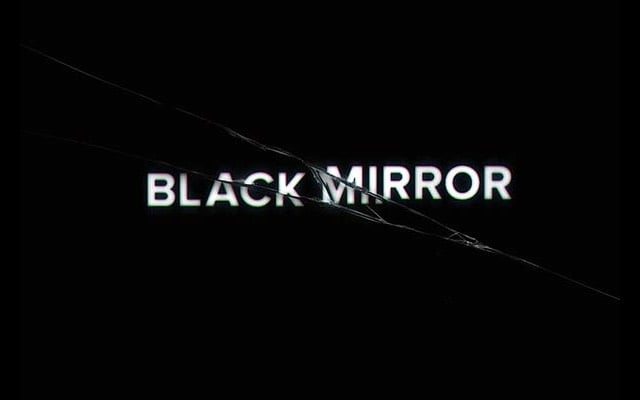
Netflix and Charlie Brooker have agreed to make 12 more episodes of the fantastic Black Mirror.
Netflix has commissioned House of Tomorrow to produce the twelve new episodes as a Netflix original series. House of Tomorrow’s Charlie Brooker and Annabel Jones, who executive produced the first seven episodes of the series, will continue to serve as executive producers and showrunners for the new episodes. Brooker has commenced writing the new episodes, which are scheduled to begin production in late 2015 from the series’ production base in the UK.
“It’s all very exciting — a whole new bunch of Black Mirror episodes on the most fitting platform imaginable. Netflix connects us with a global audience so that we can create bigger, stranger, more international and diverse stories than before, whilst maintaining that ‘Black Mirror’ feel. I just hope none of these new story ideas come true,” said Brooker.
My three favorite TV shows from the past 5 years: Mad Men, Transparent, and Black Mirror. Second tier: Breaking Bad, Sherlock, Game of Thrones, Halt and Catch Fire, and Boardwalk Empire. (via @mccanner)
The opening credits sequence of The Wire done using clips from The Simpsons. The theme song and clips are from the third seasons of the respective shows.
Who would have guessed 15 years ago that this self-styled rebel, who wrote about waitress blow jobs and shooting heroin in his best-selling 2000 memoir, Kitchen Confidential, would become America’s contemporary answer to, say, Mark Twain — our most enthusiastic chronicler of life outside our borders?
Josh Eells tags along to get a firsthand look at Anthony Bourdain’s world domination.
Wesley Morris expertly examines the show’s achievements:
American television has always been fundamentally white. Its points of view emanate from the vantages of those who control the industry and create its content. If it deals with race as a problem, it typically can do so only if it believes there’s a solution. But as a black viewer, I’m never looking for contrition, simply an acknowledgement of a condition; I don’t need television — or American culture — to provide a remedy. Black America has tended to see the discrepancy between the cultural importance to diagnose and the delusion to attempt to cure. Merely giving a nonwhite person a speaking role is not absolution. That contradiction is visible to a black audience almost anytime it sees itself chauffeuring, housekeeping, mammying, best-friending, sidekicking, saying everything about white characters while saying nothing about itself. That was the biracial brilliance of Key and Peele. It understood race as real and racism as inevitable, and never lost sight of the way in which individual white people can be agents of change but also of offense, wittingly or not supporting a system of demoralization.
Kwame Opam discusses how the show lived and grew across the world wide web:
Key & Peele’s greatest strength and weakness was its format; as a sketch show, it’s best remembered for its bite-sized bits — most of which wound up online. “Substitute Teacher,” which first aired in 2012, is one of the show’s earliest highlights. It quickly went viral, and right it now boasts more than 80 million views on YouTube. Earlier this year, Paramount even announced it plans on turning it into a feature-length film. But the episode it premiered on only pulled in 1.16 million viewers at the time, a drop in the bucket compared to its online views. And it makes sense, especially for a huge swath of the population that doesn’t have cable. Why wait for the show when you can watch the best clips on the internet?
This is a complex but not unique irony: how a slice of pop culture in 2015 can be popular enough for the President himself to take notice (and embrace it), and to seem to have zeitgeist-defining properties, but not be quite popular enough to sustain a half hour in basic cable.
Maybe that’s tied to something Morris and Opam touch on but don’t quite name. More than any show on television, to my mind, Key and Peele felt young. Not young in the shallow way that all media, maybe especially television, seem to exploit young talent; not young in the same reckless, juvenile way Chappelle’s Show or vintage Saturday Night Live was; young in the open, searching, insouciant, absurdist key that’s so important to sketch comedy.
That’s what’s in the mix of what Morris rightly identifies as the show’s blend of sadness and acceptance. It’s youth knowing that this is not forever, that it would be wrong to linger, that the future (and everything good, bad, and unchanging that comes with it) is inevitable.
Twenty-five years after its first airing on PBS, Ken Burns has remastered his epic documentary, The Civil War, and PBS will be airing the new version all this week, starting tonight. The remastered series will also be available on Blu-ray in October.
If you recut the scenes from seasons seven & eight of Seinfeld to emphasize certain aspects of Susan’s death-by-envelope, you get a feel-good TV movie about George Costanza, a man who finds triumph in the midst of tragedy.
Her death takes place in the shadow of new life; she’s not really dead if we find a way to remember her.
Everyone knows that The Karate Kid is the story of Daniel LaRusso, an undersized new-kid-in-school who, with the help of a wise mentor and unconventional training in the martial arts, is able to triumph over a gang of bullies picking on him. What this video presupposes is, maybe Daniel is the real bully?
To no one’s surprise, Johnny advances to the final round and karma catches up with Daniel when his leg is injured by the boy he wantonly attacked on the soccer field. However, just as Johnny is about to be awarded his trophy, Daniel is granted unnatural strength by the demon sorcerer Miyagi, enabling him to defeat Johnny and win the tournament in an upset.
See also more revisionist history of beloved media: Hermione Granger as the real hero of the Harry Potter books and Tim Carmody’s The Iceman List, which is about “classic movie antagonists who were actually pretty much right all along”.
Update: Another one to add to the list: Ross Geller is the hero of Friends, an intellectual and romantic man who is brought low by his so-called friends:
But the characters of the show were pitted against him from the beginning (consider episode 1, when Joey says of Ross: “This guy says hello, I wanna kill myself.”) In fact, any time Ross would say anything about his interests, his studies, his ideas, whenever he was mid-sentence, one of his “friends” was sure to groan and say how boring Ross was, how stupid it is to be smart, and that nobody cares. Cue the laughter of the live studio audience. This gag went on, pretty much every episode, for 10 seasons. Can you blame Ross for going crazy?
And like a Greek tragedy, our hero is caught in a prophecy that cannot be avoided. The show’s producers, akin to the immutable voice of the gods, declared that Ross must end up with Rachel, the one who shops. Honestly, I think he could’ve done better.
PBS is airing a documentary in September about Muppets creator Jim Henson called In Their Own Words: Jim Henson.
I had never really noticed before that Henson’s natural speaking voice obviously sounds a lot like Kermit. (via @khoi)
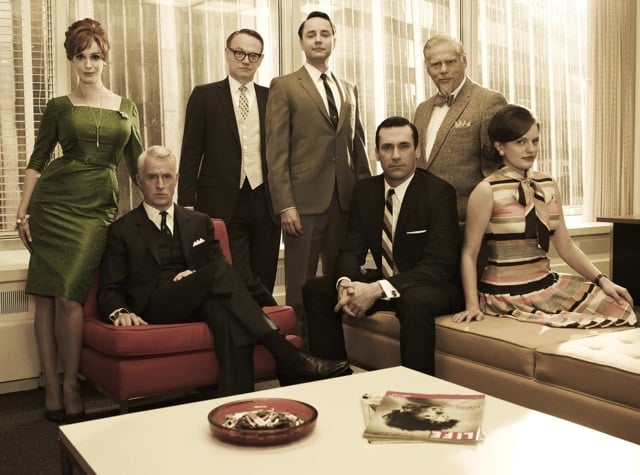
One of my favorite movie/TV critics, Matt Zoller Seitz, is coming out with a book this fall on Mad Men called Mad Men Carousel: The Complete Critical Companion.
Mad Men Carousel, authored by Abrams’ bestselling author Matt Zoller Seitz, will gather all of Seitz’s widely read (and discussed) Mad Men essays in a single volume. Rather than simply recalling the plot through lengthy summary, Seitz’s essays dig deep into the show’s themes, performances and filmmaking, with the tone and spirit of accessible, but serious, film or literary criticism. This novel-sized volume will be designed to have a 1970s feel and will be broken into seven sections, one for each season.
Seitz wrote the dreamy The Wes Anderson Collection.
Still, where did the lighter fluid come from?
Sister is my new mother, Mother.
I’m afraid I just blue myself.
I’m about halfway through season two of Arrested Development again on Netflix and it might be the best show ever on television. I’m not even kidding.
Update: NPR has been obsessively cataloging the show’s running gags here. Holy shit, the extensive foreshadowing of Buster losing his hand! This show is amazing. (via @Nick__Vance)
In the mid-90s, Stewart Brand published a fantastic book called How Buildings Learn: What Happens After They’re Built.
Buildings have often been studies whole in space, but never before have they been studied whole in time. How Buildings Learn is a masterful new synthesis that proposes that buildings adapt best when constantly refined and reshaped by their occupants, and that architects can mature from being artists of space to becoming artists of time.
From the connected farmhouses of New England to I.M. Pei’s Media Lab, from “satisficing” to “form follows funding,” from the evolution of bungalows to the invention of Santa Fe Style, from Low Road military surplus buildings to a High Road English classic like Chatsworth-this is a far-ranging survey of unexplored essential territory.
In 1997, Brand and the BBC did a six-part TV series based on the book. Brand has put the series on his YouTube channel; here’s the first part to get you going:
(via open culture)
Netflix and HBO know what you did last summer. And they know you’re still doing it this summer. The sharing of login credentials is so widespread that the big streaming players are losing hundreds of millions a year. So why don’t they stop us? Two reasons: It’s all about growth at this point. And no one has come up with a way to limit credential sharing without hurting the customer experience.
Amazon is a different kind of movie studio. It’s all about getting more people to become Prime members.
You can have the best technology, you can have the best business model, but if the storytelling isn’t amazing, it won’t matter. Nobody will watch. And then you won’t sell more shoes.
With the pace of the excellent Sherlock series slowing down a bit because of scheduling (Cumberbatch, Freeman, Moffat, and Gatiss are increasingly busy), they still somehow found time to shoot a Christmas special that will air in December 2015. Here’s a short teaser scene:
Update: A longer trailer. Makes it look a bit darker than the regular show, which I’m not sure is a good thing.
Stay Connected